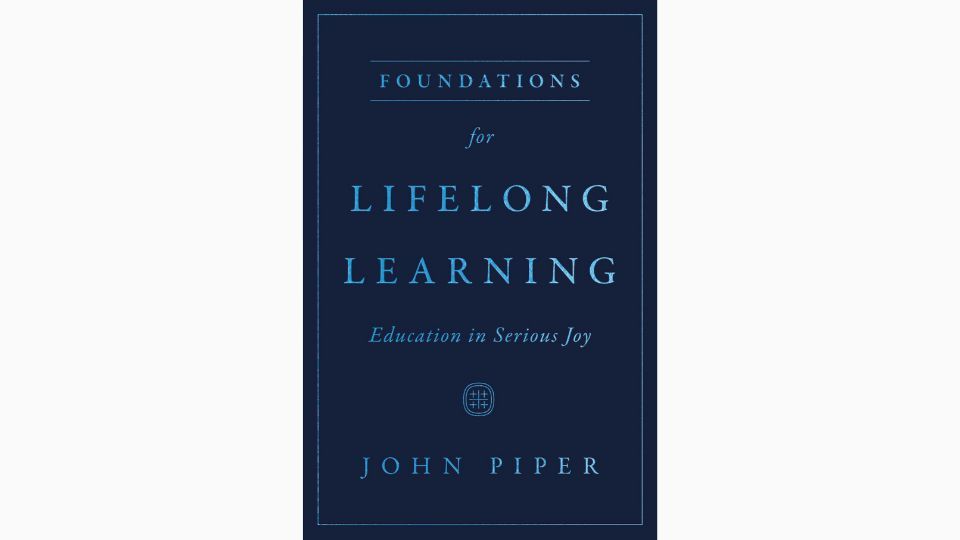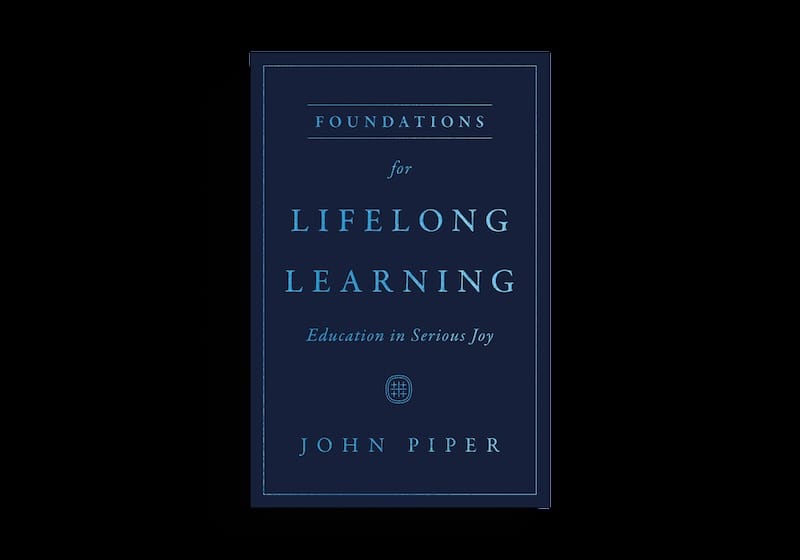Foundations for Lifelong Learning: Education in Serious Joy
John Piper shares his philosophy on education and proposes six activities: observe, understand, evaluate, feel, apply, and express.

Foundations for Lifelong Learning: Education in Serious Joy
Foundations for Lifelong Learning is a 171 page book written by John Piper and published by Crossway in 2023. John Piper is the founder of Desiring God Ministries. He was the senior pastor of Bethlehem Baptist Church, and he currently serves as the chancellor of Bethlehem College and Seminary.
1. Purpose of Foundations for Lifelong Learning
John Piper wrote this book "to give a glimpse into the way we think about education at Bethlehem College and Seminary." (ix) The book reveals the author's philosophy of education and lifelong learning to help adult Christians continue their pursuit of knowledge and wisdom.
2. Content of Foundations for Lifelong Learning
Piper begins this book with an introduction to the purpose of education. Piper states that "the great purpose of lifelong learning—education in serious joy—is to magnify Christ by enjoy him above all things and in all things, with the kind of overflowing, Christlike joy, that is willing to suffer as it expands to includes others in it." (6) To treasure Christ above all things and in all things, we must know God's word and God's world. He then offers "six habits of mind and heart" to foster lifelong learning for the glory of Christ: observation, understanding, evaluation, feeling, application, and expression.
Chapter 1: Observation
The first habit is observation. Piper defines observation as using our five senses (sight, hearing, taste, smell, and touch) to accurately and thoroughly study God and God's natural world since both are outside our subjective consciousness. The lifelong Christian learner should observe himself, others, the Bible, and Christ (through the world and God's word).
Chapter 2: Understanding
"Understanding is the mind's grasp of how things fit together to lead to a valid conclusion...Understanding is seeing how the things fit together and lead to that valid conclusion." (48) Piper argues that Aristotelian logic is both valid and necessary to properly understand God and His created world. Jesus used logical argumentation in the Sermon on the Mount (Matt 7:7–12) and through illustrations (Matt 16:2–3) when answering the Pharisees. Observation is not profitable if it does not lead to clear understanding.
Chapter 3: Evaluation
The third habit is to evaluate and make sound judgments concerning the truth and goodness of what we have seen and understood. Because our will is not neutral, we must go through life making evaluations. However, "the reality of sin [is] a huge obstable to moving from understanding to evaluation," (87) Christians must understand that God is the standard for truth and goodness. Furthermore, prayer is essential for us to evaluate fairly and correctly.
Chapter 4: Feeling
The fourth habit is to feel properly what has been observed, understood, and evaluated. Piper uses the word "feelings" as a synonym for spiritual affections that have moral significance and come from the heart (not merely the physical body). Piper argues that spiritual affections for Christians are essential.
Chapter 5: Application
The fifth habit is applying "what we have learned and seeking ways to turn it into wise and useful actions." (118) It is putting James 1:22 into practice to "be doers of the word, and not hearers only." Lifelong learners should desire to turn their acquired knowledge and proper feelings into visible deeds to glorify God and serve others.
Chapter 6: Expression
The sixth habit, which is a subset of application, is expression. The activity here is to cultivate the ability to express oneself using written or spoken words to communicate what we have observed, understood, evaluated, felt, and applied. Christians should grow in their usage of words to glorify God and edify others. Our words should be true, clear, authentic, thoughtful, creative, timely, and clean.
3. Commentary of Foundation for Lifelong Learning
In writing this book, John Piper succeeds in sharing his overall philosophy on education and lifelong learning. He explains how education should fit in the overall paradigm of Christian hedonism, the belief that the Christian's ultimate goal in life is to glorify God by enjoying Him forever. Hence the subtitle, "Education in Serious Joy."
By organizing the disciplines of the lifelong learner into six habits, Piper succeeds in clearly communicating the primary activities Christians should employ in their pursuit of further education.
The first habit of observation is not to rehash the scientific method. Rather, the argument is that because creation was made for the glory of Christ (Col 1:15–17), it is necessary for Christians to study the created world to facilitate that end. This includes observing people, history, culture, and society in addition to the created natural world. As a physician who has focused his pursuits primarily in the sciences, I was persuaded to read more history, secular literary works, and even poetry.
The second habit recognizes the value of studying logic as described by Aristotle. The discipline of thinking, meditating, and laboring for greater understanding is balanced with the dependency we must have on the Holy Spirit and His illumination. A practical suggestion Piper made that I take to heart is how to approach reading Bible commentaries. Rather than simply looking at a commentator's conclusions, we should evaluate his arguments and premises.
On the fourth habit, one can see Jonathan Edward's heavy influence on Piper. Edward's writings on "religious affections" form the basis of Piper's discussion on the habit to develop proper "feelings."
Piper concedes that the sixth habit, expression, is a part of the fifth habit of application. I agree with the author's assessment on the importance of communicating in words what one has observed, understood, evaluated, felt, and applied. In this article, I sought to cultivate Piper's sixth habit in summarizing my thoughts and feelings pertaining to this book.
4. Comparison Analysis
John Piper references Mortimer Adler's classic book, How to Read a Book? on multiple occasions since Adler expounds more fully the first three habits, providing instruction on how to read to understand thoroughly and evaluate fairly. Adler, who is not a Christ follower, does not acknowledge man's sin condition, so Piper's discussion is more complete for Christian readers.
Other books written on Christian education including Recovering the Lost Tools of Learning by Douglas Wilson who argues that education cannot be neutral. according to Wilson, Christians should return to a classical model of education which should presuppose a God-centered worldview.
5. Final Thoughts on Foundation for Lifelong Learning
Foundations for Lifelong Learning is an important book that successfully defines God's central purpose for Christian education. As the author intended, this book will help young adults in their formal education and older adults who are educators. I also recommend this book to any Christian who desires the right motivation and helpful guidance on how to grow in their pursuit of lifelong learning.

Foundations for Lifelong Learning: Education in Serious Joy
Written by John Piper | Crossway (2023)




